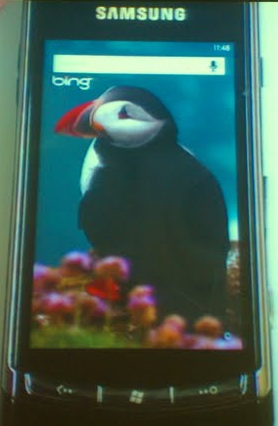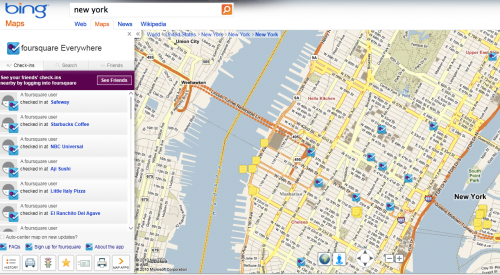If Windows Phones Don’t Succeed Can Bing?
Yesterday at the Bing Search Summit in San Francisco I finally got my hands (for about 30 seconds) on a Windows 7 phone. It had a very slick interface, although that was about all I got to see. The point of the Microsoft event was to highlight Bing’s gains and momentum as well as show […]
Yesterday at the Bing Search Summit in San Francisco I finally got my hands (for about 30 seconds) on a Windows 7 phone. It had a very slick interface, although that was about all I got to see.
The point of the Microsoft event was to highlight Bing’s gains and momentum as well as show off some new things in the product pipeline. Part of the discussion was about Bing Search and Bing Maps on mobile devices. Accordingly the company released a few mobile statistics of interest:
- 23 million US users of Bing Mobile
- 160 percent YoY query growth
- 4.3 million downloads of Bing’s iPhone app

Microsoft also informally announced that a native Android client was coming in the near future.
With that, the company will now offer native apps for all the major smartphone platforms, as well as an HTML5 mobile website. With Windows 7 mobile devices coming out later this year, the question arises: If they don’t take off can Bing still grow in mobile?
There’s a great deal of skepticism in the tech press about the outlook for Windows 7 Phones. This is partly about Microsoft’s mobile track record and partly about the recent failure of its much-hyped but short-lived Kin. Yet despite the recent abrupt abandonment of Kin the company reiterated that it doesn’t intended to cede the mobile market to Apple and Google.
I have no perspective on whether the device I had in my hand is a winner or not. The UI looked good and that was about all I can say. But let’s assume for argument’s sake right now that Windows 7 phones don’t set the world on fire. What happens to Bing Mobile?
At one time the fates of Bing and Windows Mobile were inextricably bound up with one another. But that has changed dramatically in the past year.
Microsoft once mocked the iPhone but since then has embraced it. The company has also diversified to BlackBerry and soon Android, as mentioned. What this means is that Bing’s identity and success or failure is not tied directly to the Microsoft mobile OS. Even if it fails or falls short of expectations, Bing can still succeed.
Indeed, the Bing iPhone app, which recently updated, is very strong and now includes a barcode scanner and social tools in addition to mapping and voice search capabilities. Most people don’t really know all the things that the Bing app offers and so far Microsoft hasn’t done a great job of exposing those features to the masses. The company said it was starting to promote mobile in its TV ads however.
Interestingly Microsoft SVP Satya Nadella said that the company observed something of a “halo effect” from people using the iPhone app and other mobile apps. Some of those people were trying and using Bing on the PC. He didn’t cite any data however.
Mapping and Bing mobile are now part of the same team at Microsoft; and the company is trying to bring more of the features of the PC version of Bing and Bing Maps into mobile in ways that make sense on the go.
Bing Maps architect Blaise Agüera y Arcas discussed how it was now a platform for third party developers, citing Map Apps. He said that more than a thousand developers had signed up for the Maps SDK to date.
He then demonstrated a number of those apps including the Foursquare app, which shows check-ins in real time on the PC. Agüera y Arcas added that Microsoft wanted to bring the richness of that third party data and experience to mobile users as well.
Google is clearly the leader in browser-based mobile search but it’s not as fully entrenched in mobile as it is on the PC. The Bing demos and roadmap were very interesting and if Microsoft can market Bing successfully it will see Bing Mobile continue to grow — whether or not Windows 7 devices “make it.” If they do succeed, however, that could provide a further boost to Bing Mobile.
But now it’s a “nice to have” rather than a “must have.”
Contributing authors are invited to create content for Search Engine Land and are chosen for their expertise and contribution to the search community. Our contributors work under the oversight of the editorial staff and contributions are checked for quality and relevance to our readers. The opinions they express are their own.
Related stories
